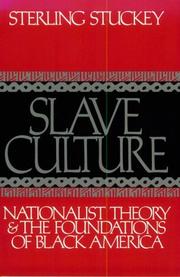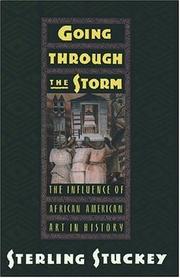| Listing 1 - 6 of 6 |
Sort by
|
Book
ISBN: 0807054283 0807054291 Year: 1972 Publisher: Boston Beacon Press
Abstract | Keywords | Export | Availability | Bookmark
 Loading...
Loading...Choose an application
- Reference Manager
- EndNote
- RefWorks (Direct export to RefWorks)
African Americans --- Slavery --- Afro-Americans --- Black Americans --- Colored people (United States) --- Negroes --- Africans --- Ethnology --- Blacks --- Abolition of slavery --- Antislavery --- Enslavement --- Mui tsai --- Ownership of slaves --- Servitude --- Slave keeping --- Slave system --- Slaveholding --- Thralldom --- Crimes against humanity --- Serfdom --- Slaveholders --- Slaves --- History&delete& --- Sources --- United States --- History --- Black people --- Enslaved persons
Book
ISBN: 9780195372700 0195372700 Year: 2009 Publisher: Oxford New York [etc.] Oxford University Press
Abstract | Keywords | Export | Availability | Bookmark
 Loading...
Loading...Choose an application
- Reference Manager
- EndNote
- RefWorks (Direct export to RefWorks)
Melville, Herman, --- Criticism and interpretation. --- Knowledge --- Melville, Herman --- Criticism and interpretation --- Africa
Book
ISBN: 0199931674 0199356025 1299925812 0199935025 9780199935024 9780199931675 0199356017 Year: 2014 Publisher: New York : Oxford University Press,
Abstract | Keywords | Export | Availability | Bookmark
 Loading...
Loading...Choose an application
- Reference Manager
- EndNote
- RefWorks (Direct export to RefWorks)
An updated edition of the highly acclaimed contribution to African-American scholarship, 'Slave Culture' considers how various African peoples interacted on the plantations of the South to achieve a common culture, tracing of the roots of black nationalist feelings in America over several centuries.
Race relations. --- Slavery --- History. --- Integration, Racial --- Race problems --- Race question --- Relations, Race --- Ethnology --- Social problems --- Sociology --- Ethnic relations --- Minorities --- Racism

ISBN: 0198021240 1280523611 1423736362 1601297181 9781423736363 0195056647 9780195056648 9781280523618 9786610523610 6610523614 0195042654 9780195042658 Year: 1988 Publisher: New York : Oxford University Press,
Abstract | Keywords | Export | Availability | Bookmark
 Loading...
Loading...Choose an application
- Reference Manager
- EndNote
- RefWorks (Direct export to RefWorks)
In this ground-breaking study, Sterling Stuckey, a leading cultural historian and authority on slavery, explains how different African peoples interacted on the plantations of the South to achieve a common culture. He argues that, at the time of emancipation, slaves still remained essentially African in culture, a conclusion with profound implications for theories of black liberation and for the future of race relations in America. Drawing evidence from the anthropology and art history of Central and West African cultural traditions and exploring the folklore of the American slave, Stuckey rev
Slavery --- African Americans --- Pan-Africanism --- African relations --- African cooperation --- Regionalism (International organization) --- Afro-Americans --- Black Americans --- Colored people (United States) --- Negroes --- Africans --- Ethnology --- Blacks --- African American slavery --- Slavery in the United States --- Race identity --- History --- Sociology of minorities --- History of North America --- anno 1800-1899 --- United States --- Black people --- United States of America

ISBN: 019508604X Year: 1994 Publisher: New York Oxford University Press
Abstract | Keywords | Export | Availability | Bookmark
 Loading...
Loading...Choose an application
- Reference Manager
- EndNote
- RefWorks (Direct export to RefWorks)
Art --- History of North America --- United States of America
Book
ISBN: 9780199768561 Year: 2011 Publisher: Oxford : Oxford University Press,
Abstract | Keywords | Export | Availability | Bookmark
 Loading...
Loading...Choose an application
- Reference Manager
- EndNote
- RefWorks (Direct export to RefWorks)
Although Herman Melville's masterworks Moby-Dick and Benito Cereno have long been the subject of vigorous scholarly examination, the impact of African culture on these works has received surprisingly little critical attention. Presenting a groundbreaking reappraisal of these two powerful pieces of fiction, Sterling Stuckey reveals how African customs and rituals heavily influenced one of America's greatest novelists.The Melville that emerges in this innovative, intertextual study is one profoundly shaped by the vibrant African-influenced music and dance culture of nineteenth-century America. Drawing on extensive research, Stuckey reveals how celebrations of African culture by black Americans, such as the Pinkster festival and the Ring Shout dance form, permeated Melville's environs during his formative years and found their way into his finest fiction. Also demonstrated is the extent to which the author of Moby-Dick is indebted to Frederick Douglass's depiction of music, especially the blues, in his classic slave narrative. Connections between Melville's work and African culture are also extended beyond America to the African continent itself. With readings of hitherto unexplored chapters in Delano's Voyages and Travels in the Northern and Southern Hemispheres and other nonfiction sources--such as Joseph Dupuis's Journal of a Residence in Ashantee --Stuckey links Benito Cereno and Moby-Dick , pinpointing the sources from which Melville drew to fashion major characters that appear aboard both the Pequod and the San Dominick .Combining inventive literary and historical analysis, Stuckey shows how myriad aspects of African culture coalesced to create the unique vision conveyed in Moby-Dick and Benito Cereno. Ultimately, African Culture and Melville's Art provides a wealth of insight into the novelist's expressive power and the development of his distinct cross-cultural aesthetic.
| Listing 1 - 6 of 6 |
Sort by
|

 Search
Search Feedback
Feedback About UniCat
About UniCat  Help
Help News
News